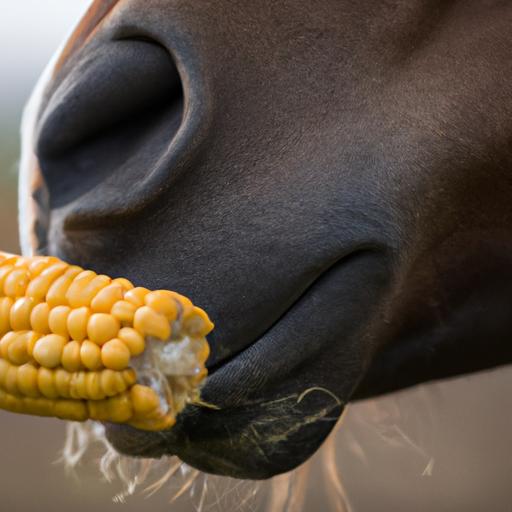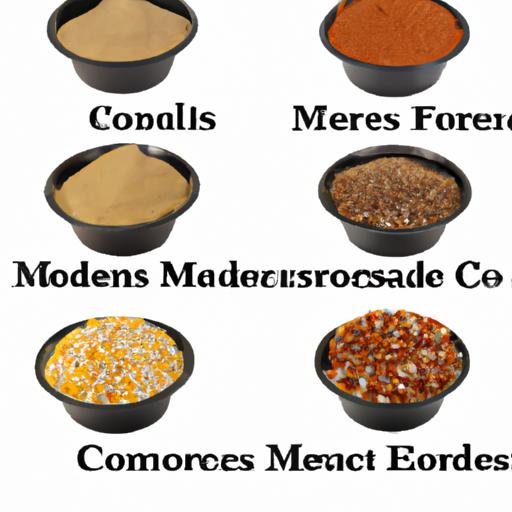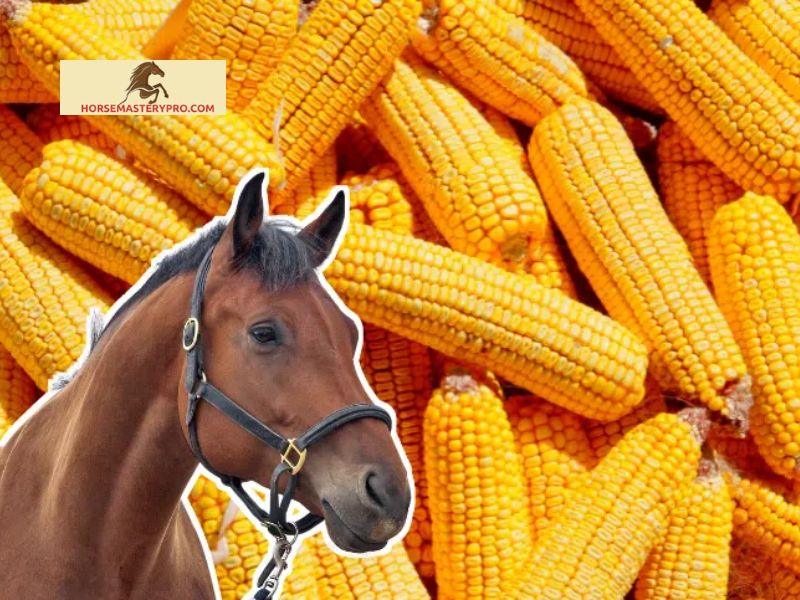Unveiling the Nutritional Value of Corn for Horses: Benefits, drawbacks, and importance of moderation when feeding corn to equine companions. do horses eat corn? Find out here.
Horses are magnificent creatures that have captured our hearts for centuries. As equestrians, we strive to provide the best care for our equine companions, ensuring their health and happiness. One crucial aspect of horse care is understanding their dietary needs. With a plethora of horse feed options available, it’s important to delve into the question that often arises: “Do horses eat corn?”
Understanding what constitutes a horse’s diet is of paramount importance to ensure their overall well-being. Horses are herbivores, naturally adapted to graze on grass and forage. However, domestication has introduced various feed options to accommodate their nutritional requirements. This article will explore the world of horse feed and focus on the intriguing query surrounding corn consumption by horses.
When it comes to horse feed, there are numerous options available, each with its own benefits and drawbacks. Hay, grass, grains, and concentrates are among the primary choices for horse owners. While hay and grass form the foundation of a horse’s diet, grains and concentrates are often used as supplements or to meet specific dietary needs. But what about corn? Can horses consume this widely available grain?
Stay tuned as we unravel the nutritional value of corn for horses and shed light on its suitability as a feed option. We’ll delve into the composition and benefits of corn, while also discussing potential risks and the importance of moderation. So, saddle up and join me on this journey to uncover the truth about whether horses can, indeed, eat corn.
Understanding the Equine Digestive System

The digestive system of horses is a fascinating and intricate mechanism that plays a vital role in their overall health. To comprehend how horses process their food, it is crucial to have a basic understanding of their digestive anatomy.
A. Brief Explanation of the Horse’s Digestive Anatomy
Horses possess a unique digestive system designed to efficiently process plant material. Their digestive tract consists of several distinct compartments, each serving a specific purpose. It begins with the mouth, where horses use their lips and teeth to graze on grass or consume feed. From there, the food travels down the esophagus into the stomach.
Unlike humans, horses have a relatively small stomach in proportion to their body size. This limits the amount of food they can hold at once, making frequent grazing necessary. After the stomach, the food enters the small intestine, where the majority of nutrient absorption occurs. From the small intestine, undigested material proceeds to the large intestine.
B. Discussion on the Horse’s Natural Diet in the Wild
In the wild, horses roam vast grasslands, consuming a diet primarily composed of forage, such as grass and hay. They are natural grazers, spending around 16 to 18 hours a day foraging for food. This constant grazing ensures a steady intake of fiber, which is crucial for their digestive health.
The equine digestive system has evolved to efficiently break down fibrous plant material through microbial fermentation. This fermentation process occurs in the large intestine, specifically the cecum and colon, where beneficial bacteria break down cellulose and other complex carbohydrates into digestible nutrients.
C. Importance of Mimicking Their Natural Diet for Optimal Health
Understanding the horse’s natural diet is essential for providing them with a nutritionally balanced and healthy feeding regimen. While domesticated horses may not have access to vast grasslands, it is crucial to mimic their natural grazing behavior as closely as possible.
Regular access to high-quality forage, such as good-quality hay, is vital for maintaining a healthy digestive system. It provides the necessary fiber and promotes proper gut function. Additionally, replicating their grazing behavior by offering small, frequent meals throughout the day can help prevent digestive issues and promote overall well-being.
By comprehending the intricacies of the equine digestive system and emulating their natural diet, we can ensure that our horses thrive and enjoy optimal health. So, let’s explore further to answer the question: “Do horses eat corn?”
Factors to Consider Before Feeding Corn to Horses

Feeding horses involves careful consideration of various factors to ensure their optimal health and well-being. Before incorporating corn into your equine companion’s diet, it is crucial to assess several key elements. Let’s explore the essential factors that should be taken into account before feeding corn to horses.
A. Age, Weight, and Activity Level of the Horse
The age, weight, and activity level of your horse play a significant role in determining their dietary needs. Younger horses, such as foals and weanlings, have specific nutritional requirements to support their growth and development. Likewise, older horses may require tailored diets to address age-related issues. When considering corn as part of their feed, it is vital to evaluate whether it aligns with these specific needs.
Additionally, the weight and activity level of your horse are crucial factors to consider. Horses with higher activity levels, such as competitive athletes or working horses, may require additional energy sources. On the other hand, overweight or sedentary horses may benefit from a more controlled diet. Understanding your horse’s individual needs will help determine whether corn is a suitable option.
B. Potential Risks and Allergies Associated with Corn Consumption
While corn can be a valuable addition to a horse’s diet, it’s essential to be aware of potential risks and allergies. Some horses may have sensitivities or allergies to corn, resulting in digestive disturbances or other adverse reactions. Additionally, corn can be higher in starch compared to other feed options, which may pose challenges for horses with certain health conditions, such as metabolic disorders.
To ensure the well-being of your horse, carefully monitor their response to corn consumption and watch for any signs of allergies or digestive issues. If you notice any adverse reactions, it’s crucial to consult a veterinarian or equine nutritionist for guidance on alternative feed options.
C. Advice on Consulting a Veterinarian or Equine Nutritionist
As responsible horse owners, seeking professional advice is key to making informed decisions about your horse’s nutrition. Before introducing corn into your horse’s diet or making any significant dietary changes, it is highly recommended to consult a veterinarian or equine nutritionist. These experts can assess your horse’s individual needs, consider any pre-existing health conditions, and provide personalized recommendations.
Their expertise will help you navigate the complexities of horse nutrition, ensuring that your equine companion receives a balanced and appropriate diet. Remember, your horse’s well-being should always be the top priority, and professional guidance will help you make the best choices for their overall health.
By considering these crucial factors and seeking professional advice, you can make an informed decision about feeding corn to your horses, ensuring their health and happiness. Let’s move forward and explore alternative grains suitable for equine diets in the following section.
Alternatives to Corn in Horse Diets

When it comes to providing a well-rounded diet for our equine companions, it’s essential to explore alternative grain options to corn. While corn can be a viable feed choice for horses, it’s crucial to offer variety and consider other grains that can provide similar nutritional benefits. Let’s dive into the world of alternative grains suitable for horses and discover the advantages and disadvantages they bring.
A. Introduction to Alternative Grains Suitable for Horses
While corn is a commonly used grain, there are several other options that can complement or replace it in a horse’s diet. Oats, barley, wheat, and rice bran are popular alternatives that offer their own unique nutritional profiles. Oats, in particular, are a favorite among horse owners due to their high fiber content and digestibility. Barley, with its energy-rich composition, is another excellent grain choice for performance horses. Wheat and rice bran also provide additional nutrients and can be used to supplement a horse’s diet effectively.
B. Discussion on the Benefits and Drawbacks of Each Grain Option
Each alternative grain option comes with its own set of advantages and disadvantages. Oats, for instance, are highly palatable and provide a good source of energy for horses. They are low in starch and high in fiber, making them an excellent choice for horses that require slow-release energy. Barley, on the other hand, is energy-dense and can provide a quick burst of energy, making it suitable for performance horses. However, it should be used with caution due to its higher starch content. Wheat and rice bran offer additional nutritional benefits, such as essential fatty acids and vitamins, but should be fed in moderation to avoid imbalance in the overall diet.
C. Tips for Incorporating a Variety of Grains in a Horse’s Diet
To ensure a well-balanced diet, it’s crucial to incorporate a variety of grains in a horse’s feeding regimen. This can be achieved by offering a blend of different grains or rotating them periodically. By doing so, you can provide your horse with a broader range of nutrients while avoiding potential downsides associated with feeding a single grain exclusively. It’s essential to monitor your horse’s response to different grains and adjust the proportions accordingly, taking into consideration their age, weight, and activity level.
In conclusion, while corn can be a suitable grain option for horses, it’s vital to explore alternatives and provide a diverse diet to meet their nutritional needs effectively. Oats, barley, wheat, and rice bran offer viable options, each with its own set of benefits and drawbacks. By incorporating a variety of grains in your horse’s diet, you can ensure a well-balanced and nutritious meal plan that promotes their overall health and well-being.
Conclusion
In conclusion, understanding a horse’s dietary needs is crucial for their overall health and well-being. While horses are herbivores by nature, the question of whether horses eat corn has piqued the curiosity of many equestrians.
Throughout this article, we have explored the nutritional value of corn for horses and evaluated its benefits and drawbacks as a feed option. Corn is rich in carbohydrates and offers a good source of energy. However, it also contains lower levels of essential nutrients compared to other grains.
When considering feeding corn to horses, moderation is key. Excessive corn intake can lead to digestive issues, such as colic or laminitis. Therefore, it is vital to consult with a veterinarian or equine nutritionist to determine the appropriate amount of corn to incorporate into a horse’s diet, taking into account factors such as age, weight, and activity level.
While corn can be a part of a horse’s diet, it is important to remember that it should not be the sole source of nutrition. Incorporating a variety of grains, grasses, and forage is essential for providing a balanced and nutritious diet for our equine companions.
At horsemasterypro.com, we strive to provide comprehensive guidance on horse care and nutrition. By understanding the dietary needs of our horses and making informed decisions, we can ensure they lead healthy and fulfilling lives. Remember, the well-being of our equine friends should always be our top priority.
So, let’s continue our journey together, unraveling the mysteries of equine nutrition, and ensuring the best care for our beloved horses at horsemasterypro.com.


